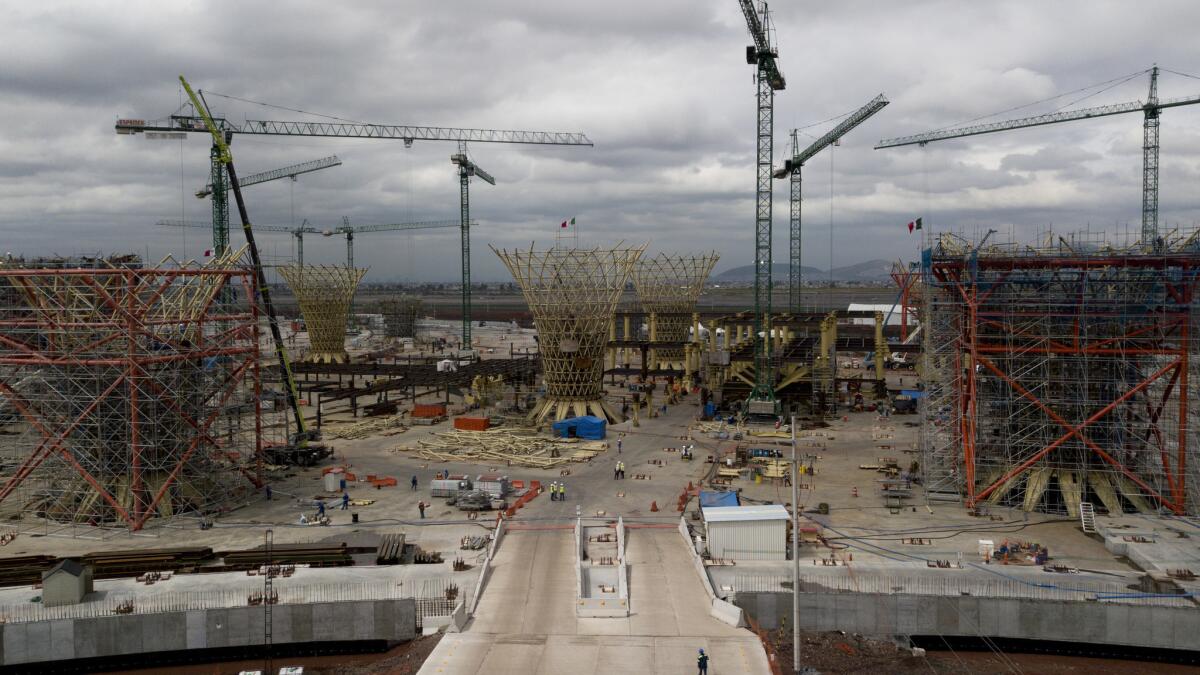Mexico’s president-elect looks to calm fears after economic fallout over airport cancellation

Reporting from Mexico City — Mexican President-elect Andres Manuel Lopez Obrador on Tuesday sought to reassure edgy investors and business leaders alarmed about his controversial decision to cancel the capital’s $13-billion airport project — a move that sent the peso plummeting, roiled financial markets and enraged much of the country’s impresario class.
“There is nothing to fear,” Lopez Obrador, who takes office on Dec. 1, said in a damage-control video message on YouTube. “We have said one thousand and one times that we will guarantee the investments, the contracts.”
Lopez Obrador had reached out to Mexico’s business community following his landslide election victory in July, signaling a conciliatory and pragmatic posture that calmed markets and eased fears stirred by his often-fiery leftist oratory.
But much of that reassurance seemed to evaporate after he declared on Monday that he would scrap the airport project after a national vote that was organized by his supporters and saw only a tiny slice of the electorate cast ballots.
The peso lost more 3.6% of its value in 24 hours, exceeding the 20 peso to-the-dollar threshold that is widely regarded here as a cause for alarm. Mexico’s benchmark stock index closed down 4.2%.
Critics argued that the president-elect’s decision — and the way it was made — could diminish investor trust in Mexico while Lopez Obrador is in office.
“A lot of foreign investors were looking at this airport issue as a litmus test of his pragmatism, or of his radicalism,” said Daniel Kerner, managing director for Latin America with the Eurasia Group, the political risk consultancy. “I think this showed the reality that Lopez Obrador will go ahead and do whatever he wants.”
Some forecasters warned of a potential wave of capital flight, a likely increase in interest rates by the central bank, and possible reductions in the already sluggish 2019 economic growth projection of about 2%.
The airport cancellation “sends a message of grave uncertainty to international markets, to investors and to all citizens [about] not fulfilling obligations of the state,” Juan Pablo Castanon, who heads the nation’s major business trade group, told reporters.
“We businessmen express our rejection of this decision and the method used to take it,” he said.
The national “consultation” on the airport question was organized by Lopez Obrador’s political bloc, lasted four days and attracted 1 million voters — a number far shy of the more than 50 million who cast ballots in national elections in July.
Roughly 70% of voters rebuffed the new airport blueprint, selecting a cheaper alternative favored by the president-elect.
Lopez Obrador is a long-time critic of the new airport, which is being built in the Texcoco area, northeast of the capital.
It is Mexico’s largest infrastructure project in years, and the government has already spent $5 billion on construction. But the president-elect and other critics say it is too expensive, laden with corruption and environmentally unsound.
A torrent of negative reaction appeared on social media and in the press following the announced cancellation.
The ditching of the airport “will be remembered as one of the worst stupidities from a president in contemporary economic history,” economist Enrique Cardenas of Mexico’s Iberoamerican University wrote on Twitter. “I hope I’m wrong.”
Isaac Katz, an economist at the Autonomous Technological Institute of Mexico, wrote: “The weakest part of the institutional arrangement in Mexico is the guarantee in fulfilling contracts. Today that got even weaker.”
In his video address on Tuesday, Lopez Obrador was characteristically combative, dismissing the wave of criticism as “an orchestrated campaign” to thwart his anti-corruption goals.
“There was a slide in the peso … not a devaluation, but it will recover,” Lopez Obrador said. “We will not commit any injustice. Investors, contractors, all will be taken care of.”
He also urged “powerful” interests to adapt to a “new reality” that will include many more citizen votes on contentious topics.
Under his less expensive airport plan, existing facilities would be upgraded and a military base outside the capital would be transformed into a commercial airfield in three years, easing overcrowding at the current hub, Benito Juarez International Airport in Mexico City.
Some experts have already raised doubts about the viability and time frame of that plan.
Lopez Obrador and his team apparently failed to envision the immediate financial implications of the cancellation.
The national currency and stock market hadn’t seen such steep dives since the election of President Trump, who came to office on an agenda that included threats to make Mexico pay for a multibillion-dollar border wall and to terminate the North American Free Trade Agreement, long a mainstay of the Mexican economy.
Cecilia Sanchez of The Times’ Mexico City bureau contributed to this report.
Cecilia Sanchez in The Times’ Mexico City bureau contributed to this report.
Twitter: @PmcdonnellLAT
More to Read
Sign up for Essential California
The most important California stories and recommendations in your inbox every morning.
You may occasionally receive promotional content from the Los Angeles Times.










